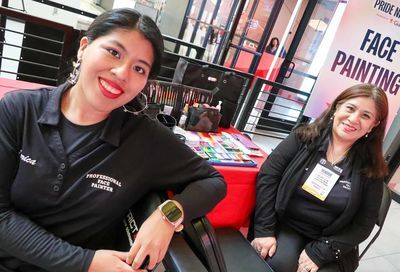Soundwaves
DJ Spooky, 'Optometry'
|
|
The Blue Series Continuum was launched on the theory that throwing together groups of mismatched musicians would have the Odd Coupling effect of producing great works of art. It’s a hit-or-miss endeavor, sometimes resulting in an unexpected alchemy, and other times sounding more like an Elton/Slim Shady burlesque Grammy duet. In this effort, Paul D. Miller, a.k.a. DJ Spooky, a.k.a. That Subliminal Kid, is partnered with Matthew Shipp (on keys), William Parker (upright bass), Guillermo E. Brown (percussion) and Joe McPhee (trumpet and sax).
Miller’s Renaissance Man persona allows him to disappear into Optometry, allowing himself to be absorbed into the collaborating artists and influencing their styles from within. While his electronic influence is the most omnipresent throughout the album, it’s also the most subtle — a desirable quality when working within a group of five. More than anything, Optometry is a jazz album with electronic elements to tweak its beat, and while it flirts with a darker, seedier mood on several tracks, overall it retains a vibrant, New York City in-scene edge.
Samples abound, but identifying what is pastiche and what’s original is basically impossible — the liner notes offer no hint, an omission undoubtedly intentional, knowing Spooky. But the album’s most titillating offer comes with its guest stars, an addition that fits in perfectly with this type of freeform experimentation, and the crowd has been culled from the avant-garde’s finest. Billy Martin, of Medeski, Martin and Wood, guides the title track through eleven minutes of dueling instrumentation, vying with Daniel Bernard Roumain on violin for the forefront. DBR, who has performed with the likes of gay choreographer Bill T. Jones, Dizzy Gillespie, 2 Live Crew and Ray Charles, is one of Optometry’s many to-be-revealed secrets. You stumble upon him in the credits after hearing his soulful, swaying string work, only to discover that he’s only one many venerated non-celebrity musicians from the NYC art crowd to appear here.
Napoleon of IsWhat?! presides over a discordant cluster of jazz beats and rhythms with an expertly delivered spoken word, as does Carl Hancock Rux, who lays down his own subdued version of a monotone rap over the slithery horn blowing of McPhee.
The whole package is wrapped up and delivered by Spooky’s ubiquitous presence. He lends a shift in rhythm here, a drum beat there, seemingly following the lead of the others rather than taking the reigns of the flying umbrella himself. The album does fall into the realm of severe esotericism at times — how about “Absentia Absentia (Dialectical Triagulation III) featuring High Priest of Anti-Pop Consortium” for a title? — but even when you don’t understand it, that doesn’t mean you don’t enjoy it. The mystery of it is exactly what makes it enjoyable. It’s beyond you, which is something rarely heard in an “electronic” disc filled with transparent trance or deep house. A good example is the John Cage diatribe “Anarchy” reprinted in the liners, a tribute to Buckminster Fuller. Don’t know who he is? That’s the point. You’re supposed to find out. It’s one more part of the package that you forces you to put in a little extra effort on your own part, and that is Optometry, and Spooky himself, in a nutshell.
Support Metro Weekly’s Journalism
These are challenging times for news organizations. And yet it’s crucial we stay active and provide vital resources and information to both our local readers and the world. So won’t you please take a moment and consider supporting Metro Weekly with a membership? For as little as $5 a month, you can help ensure Metro Weekly magazine and MetroWeekly.com remain free, viable resources as we provide the best, most diverse, culturally-resonant LGBTQ coverage in both the D.C. region and around the world. Memberships come with exclusive perks and discounts, your own personal digital delivery of each week’s magazine (and an archive), access to our Member's Lounge when it launches this fall, and exclusive members-only items like Metro Weekly Membership Mugs and Tote Bags! Check out all our membership levels here and please join us today!
Soundwaves
'This Is Ultimate Dance'

Various Artists |
Various Artists
This Is Ultimate Dance
J Records
Remember Ultimate Dance Party? Arista Records produced the popular, short-lived album series of Top 40 hits at a time when the music industry was cracking down on producers of fast-selling, non-sanctioned dance compilations of top recording artists (think MasterBeat). Arista helped satiate a disgruntled dance music market, while at the same time showcasing the diva talent at its beck and call. And it seemed to work. At least in those few pre-Napster years, before music shareware got the industry all in a tizzy. Now, after knocking out Napster and severely cutting back on the production of CD singles, the industry is fumbling around to reverse diminishing profits.
Do we care to see Ultimate Dance Party revived? We last heard from it in 1999 — before Madonna’s Music, before Thunderpuss thundered, and just as Cher and Britney began rolling the dance floor. It’s a crowded market these days, with nearly every bold-name DJ and remixer producing his own product and several small dance labels successfully established enough to be serious competition. Undeterred is Arista Records founder Clive Davis, responsible for Whitney Houston, Deborah Cox, Sarah MacLachlan, Dido and others. Through his new label, J Records, formed in the past year, Davis has renewed, and improved, the Ultimate Dance concept, bringing back the same team of producers, who now call the franchise This Is Ultimate Dance.
A big failing of This Is Ultimate Dance is that This Is Ultimately Dated. Half of the songs could have starred on a 2001 edition, and a couple others a 2000 edition. And in nearly every case, Sunshine Anderson isn’t the only one who’s “Heard It All Before,” since most of these remixes have appeared on other compilations. Most, but not all — This Is Ultimate Dance is worth the purchase for the edited Thunderpuss version of Mary J. Blige’s “No More Drama,” one of the best remixes produced so far this year and one heretofore unavailable (well, officially) in domestic release. Then there’s the also-rare and also-classic “Get Ur Freak On” from Virginia’s very own Missy Elliott, though SuperChumbo’s remix isn’t at all as super as Timbaland’s raw original.
This Is Ultimate Dance includes one brand-spankin’ new song worth mention, from a new Davis discovery, Lamya. Her pleasant voice, slightly rough-edged, is intriguing, and “Never Enough” is a debut that leaves you looking forward to her future. The album also includes Davis’s darling, Grammy-winning Alicia Keys. It’s hard to understand the hype heaped on this 21-year-old whose vocal chords release by way of her nose and whose vocal stylings keep on fallin’ in and out of key, fluttering about like the “Butterflyz” on this track. And though the Ultimate Dance reincarnation almost exclusively focuses on remixes and uptempo tracks — unlike its predecessor’s inclusion of nondanceable tracks — it still suffers from a lack of DJ blending. Songs crash into each other, sometimes at deadly speeds, and several of the remixes even cave in on themselves, as they are reduced to a radio-friendly tally of less than five minutes.
J Records seems to have a firmer sense of its target market than Arista ever did, concentrating on true dance marvels and even throwing album release parties at gay clubs or gay-friendly dance parties (in New York, at least). If only D.C. had a dance radio station. If only Napster, even a decent pay version, were available. If only the industry would better tend to us danceheads.
Support Metro Weekly’s Journalism
These are challenging times for news organizations. And yet it’s crucial we stay active and provide vital resources and information to both our local readers and the world. So won’t you please take a moment and consider supporting Metro Weekly with a membership? For as little as $5 a month, you can help ensure Metro Weekly magazine and MetroWeekly.com remain free, viable resources as we provide the best, most diverse, culturally-resonant LGBTQ coverage in both the D.C. region and around the world. Memberships come with exclusive perks and discounts, your own personal digital delivery of each week’s magazine (and an archive), access to our Member's Lounge when it launches this fall, and exclusive members-only items like Metro Weekly Membership Mugs and Tote Bags! Check out all our membership levels here and please join us today!
Soundwaves
Anastacia, Julian Marsh
|
|
|
Divas are the bread and butter of the gay clubgoing experience. But sometimes the bread is stale and the butter spoilt, leaving us with nothing but an unsavory mess. To many, Anastacia is a delicious butter croissant. She’s extremely popular in Europe, and you couldn’t avoid her a year or so ago in gay bars, where her “I’m Outta Love” was on frequent replay. But she’s not a fresh pastry and she doesn’t sound like butter to these ears. Anastacia’s pure caramel, the sticky sweet sugar that’s a staple in Twix, which she fervidly sang about in a recent commercial that reduces stereos to a chocolate-y, gooey mess.
Now this Freak of Nature is back with a second album. It is as over-baked as expected with Anastacia. The first song released from the album, “One Day In Your Life,” shows her up to her old, gloppy Trix — and it’s about the best song on here. It’s amazing how someone with such a great voice and all the professional and electronic wizardry at Sony Music at her disposal can fail to show any control over her instrument. She hacks her way through even the sweetest of songs à la Michael Bolton (“You’ll Never Walk Alone,” “I Dreamed You”) using her vibrato inappropriately. And just when she gets going in the overdone, orgiastic singing style that Whitney wrought, she falters by hitting the wrong notes — most notably several times at the end of “One Day”
The production doesn’t save her any trouble — how could it, when her producers are responsible for Jennifer Lopez, Mariah Carey, and even early boy band Color Me Badd? “Paid My Dues” features a pro-forma key change in the final chorus of the song that isn’t at all subtle or well-executed. And then there’s the matter of her lyrics, some of which she co-wrote. “You call me in the midnight hour with your velvet lies” is just one of many strained constructions, this one from “One DayÂ…” Her duet with R&B star Faith Evans, “Thought I Told You That,” adds a hip-hop flair to the album, with considerable success. But musically it sounds eerily like “If I Told You That,” Whitney’s hit of a few years back, and lyrically and stylistically it’s a pale imitation of Whitney’s duet with Deborah Cox, “Same Script, Different Cast.” Anastacia falls all over herself copying her betters. And even her equals: she cultivates the image of her Epic label mate J-Lo. In every way, she exudes a “notice me, I’m really, really confident; I’m really, really natural” aura that, like J-Lo, is all wet.
From throw-up to throw-away — among DJs who’ve produced their own dance compilation albums, Julian Marsh is one of the most prolific. He has great potential, with his preference for melodic music and his disco and trance sensibilities. But like his club engagements, his albums never fail to let me down. He doesn’t disappoint with his latest Pride. Oh, it starts off swell and ends well, but Marsh devotes most of the album to turning a number of ’80s pop songs into tired modern-day dance tracks with unknown coverbands shilling for the original artists. It rarely works, and it doesn’t work for any song on Pride. Bring back Erasure, bring back the Thompson Twins, bring back the Righteous Brothers. Okay, so forget that last one. What was Marsh thinking including “Unchained Melody” here anyway? Shut up Righteous Brothers, buck up Marsh, and next time give us something truly worthy of capital P-Pride.
Support Metro Weekly’s Journalism
These are challenging times for news organizations. And yet it’s crucial we stay active and provide vital resources and information to both our local readers and the world. So won’t you please take a moment and consider supporting Metro Weekly with a membership? For as little as $5 a month, you can help ensure Metro Weekly magazine and MetroWeekly.com remain free, viable resources as we provide the best, most diverse, culturally-resonant LGBTQ coverage in both the D.C. region and around the world. Memberships come with exclusive perks and discounts, your own personal digital delivery of each week’s magazine (and an archive), access to our Member's Lounge when it launches this fall, and exclusive members-only items like Metro Weekly Membership Mugs and Tote Bags! Check out all our membership levels here and please join us today!
Soundwaves
Dirty Vegas, Jazzanova, and Playgroup
|
DIRTY VEGAS |
JAZZANOVA |
PLAYGROUP |
While some beat heads get all George Wallace when it comes to the mongrelization of electronica and rock, it’s important to remember that some of the best music has come from genre-crossbreeding (Radiohead, certainly. The Dixie Chicks. Queen. Three waves of ska and Afro-just about anything). The hybrid’s got heaps of potential if it’s done right. If it’s done wrong, you get Dirty Vegas.
Dirty Vegas’ stab at guitar/dance beat fusion falls flat because neither their guitar nor their dance is all that interesting. They pile tepid rock chords onto a half-assed house beat and pray for alchemy, but most of the time neither one is strong enough to stand on its own. There are a few tracks that get one half right — “I Should Know” would be decent but for the electronics, ditto “Simple Things Part 2” but for the guitar. But most of the songs miss their target on both ends, floundering somewhere in synthesizer demo mode. Trancey, ambient electronica gets buried under poorly scripted vocals that crush the background rather than melt into it. When the electronics do get their energy up, they’re usually too generic to pass muster. It’s clear that Dirty Vegas is going for the electro-rock tendencies of the Verve and the Pet Shop Boys, but they come off as sounding like they know a little about dance and a little about rock, but not a whole lot about either.
Not like Jazzanova. God knows what they’re going for with their debut In Between, but damn if it isn’t intriguing. Six Berliners (three DJs, three producers) bring their German engineering to an effort part jazz, part funk, part et cetera, taking standard jazz rhythms and splicing in breaks, beats and vocals, making the song perfect fare for the swanky club set. They’ve invited familiar faces to their ultralounge, including the queen of spoken word Ursula Rucker (“Keep Falling”) and terminally hip soul junkie Vikter Duplaix of Philadelphia, who’s contributions to the DJ Kicks series have nothing short of sonic honey. Duplaix’s involvement here is strictly vocal, but the music reflects his own style anyway, making his presence seem natural and his slinking, subtle voice perfect for the downbeat jazz rhythm.
In Between crosses the line into fairly pretentious territory at times, but no more than outfits like D.C.’s Thievery Corporation, for instance. Like them, not only is Jazzanova a good enough outfit to make the haughtiness forgivable, but the overly cool tone would go perfectly with a martini and a boa, given the right environment.
Playgroup’s latest release, also a gift to the DJ Kicks collection, tunes down the pretense and offers a heavy-on-the-irony package of fuzzy electro and samples. The alias of Trevor Jackson, Playgroup revels in dark synth and altered vocals, channeling the underground dance of the 1980s. The formula works for half a dozen songs or so, but begins to lose its charm somewhere around the point where Jackson begins sampling such lines as, “Let’s get this party started quickly, right!” That’s music that doesn’t need revival, and an irony we can all do without.
Support Metro Weekly’s Journalism
These are challenging times for news organizations. And yet it’s crucial we stay active and provide vital resources and information to both our local readers and the world. So won’t you please take a moment and consider supporting Metro Weekly with a membership? For as little as $5 a month, you can help ensure Metro Weekly magazine and MetroWeekly.com remain free, viable resources as we provide the best, most diverse, culturally-resonant LGBTQ coverage in both the D.C. region and around the world. Memberships come with exclusive perks and discounts, your own personal digital delivery of each week’s magazine (and an archive), access to our Member's Lounge when it launches this fall, and exclusive members-only items like Metro Weekly Membership Mugs and Tote Bags! Check out all our membership levels here and please join us today!



























